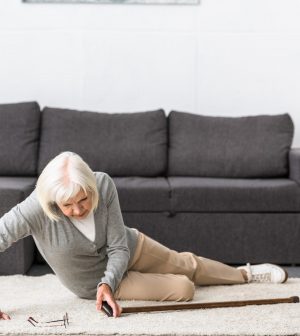- Could Your Grocery Store Meat Be Causing Recurring UTIs?
- Are You Making This Expensive Thermostat Error This Winter?
- Recognizing the Signs of Hypothyroidism
- 10 Strategies to Overcome Insomnia
- Could Artificial Sweeteners Be Aging the Brain Faster?
- Techniques for Soothing Your Nervous System
- Does the Water in Your House Smell Funny? Here’s Why
- Can a Daily Dose of Apple Cider Vinegar Actually Aid Weight Loss?
- 6 Health Beverages That Can Actually Spike Your Blood Sugar
- Treatment Options for Social Anxiety Disorder
Blood Pressure Meds Raise Fracture Risks for Those in Nursing Homes

Blood pressure medications appear to more than double the risk of life-threatening bone fractures among nursing home residents, a new study warns.
The increased risk stems from the drugs’ tendency to impair balance, particularly when patients stand up and temporarily experience low blood pressure that deprives the brain of oxygen, researchers reported recently in the journal JAMA Internal Medicine.
The risk is compounded by interactions with other drugs and nursing home patients’ existing problems with balance, they added.
“Bone fractures often start nursing home patients on a downward spiral,” said lead researcher Chintan Dave, academic director of the Rutgers Center for Health Outcomes, Policy and Economics.
“Roughly 40% of those who fracture a hip die within the next year, so it’s truly alarming to find that a class of medications used by 70% of all nursing home residents more than doubles the bone-fracture risk,” Dave added in a Rutgers news release.
About 2.5 million Americans live in nursing homes or assisted living facilities, researchers said in background notes. Up to half suffer falls in any given year, and up to 25% of those falls result in serious injury.
For the study, researchers analyzed Veterans Health Administration records for nearly 30,000 elderly patients in long-term care facilities between 2006 and 2019.
Researchers compared the 30-day risk of hip, pelvis and arm fractures for those taking blood pressure meds to those who don’t.
The fracture risk for people on blood pressure medication was 5.4 fractures per 100 people per year, compared with 2.2 per 100 for those not on blood pressure drugs.
The risk was even greater in certain groups — at least triple in people with dementia, those with systolic blood pressure above 139 and those with diastolic blood pressure above 79. Systolic is the first number on a blood pressure reading, and diastolic is the second number.
A combination of less medication and better support could help protect the health of the elderly, researchers concluded.
“Caregivers can’t strike this right balance of risk and reward if they don’t have accurate data about the risks,” Dave said. “I hope this study gives them information that helps them serve their patients better.”
More information
The U.S. Centers for Disease Control and Prevention has more about older adult fall prevention.
SOURCE: Rutgers University, news release, May 15, 2024
Source: HealthDay
Copyright © 2026 HealthDay. All rights reserved.










